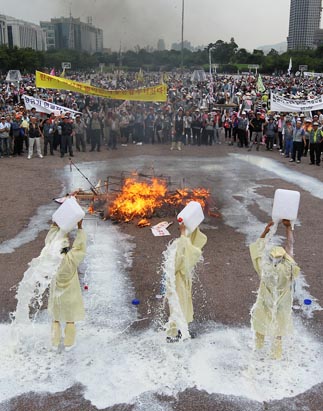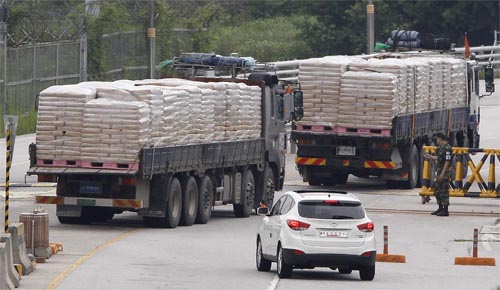
Market Information > Food News Clipping
Food News Clipping
July 27, 2011
2011.07.30
1. BILATERAL/MULTILATERAL ISSUES
Trade Minister states that ratification of KORUS FTA by the U.S. Congress in August is unlikely [Korean: BYK]
http://sbscnbc.sbs.co.kr/read.jsp?pmArticleId=10000183905
Summary: Trade Minister Jong Hoon Kim explained to the press that it was unlikely that the U.S. Congress would be able to deal with the KORSU FTA in August, due to the issue of U.S. Government¡¯s deficit ceiling. He anticipated September as the most likely time when U.S. Congress would be able to handle the KORUS FTA issue.
Clinton describes FTA with Korea as a ¡®model¡¯[English, KJH]
¡®This deal signals that America and Korea are partners for the long term.¡¯
http://joongangdaily.joins.com/article/view.asp?aid=2939361
Full Text: U.S. Secretary of State Hillary Clinton said yesterday that the country¡¯s free trade deal with Korea is a ¡°model agreement¡± for the world¡¯s largest economy.
The Korea-U.S. FTA, known as the Korus FTA, was signed in 2007 and supplemented last December. It has been awaiting approval from the legislatures of both countries.
¡°We consider Korus a model agreement,¡± Clinton said in a speech to the American Chamber of Commerce in Hong Kong. She was in Hong Kong to meet with the Chief Executive Donald Tsang and U.S. business people.
Clinton said the bilateral agreement between Korea and the U.S. will eliminate tariffs on 95 percent of U.S. consumer and industrial exports within five years.
The tariff reduction alone, which is part of the agreement, could increase exports of U.S. goods by more than $10 billion and help Korea¡¯s economy grow by 6 percent, she said.
¡°So whether you are an American manufacturer of machinery or a Korean chemicals exporter this deal lowers the barriers to reaching your customers,¡± Clinton said
The U.S. State Secretary said the Korea-U.S. FTA will raise the standards for fair competition among the companies based in the two countries, Clinton said.
¡°This trade deal isn¡¯t simply about who pays what tariffs at our borders,¡± she said.
¡°It is a deeper commitment to creating conditions to let both our nations prosper as our companies compete fairly,¡± she said, adding that the trade deal includes significant improvements on intellectual property, fair labor practices, environmental protection and regulatory due process, she explained.
She also emphasized that benefits of the agreement extend beyond the ¡°economic bottom line.¡±
¡°This agreement represents a powerful strategic bet. It signals that America and Korea are partners for the long term, economically, diplomatically, people-to-people. So for all these reasons, President Obama is pursuing congressional approval of Korus together with necessary trade adjustment assistance as soon as possible,¡± Clinton said.
Trade Adjustment Assistance is a U.S. federal program aimed at providing re-employment services to workers who have been adversely impacted by increased imports or by a shift in production or services to another country.
2. LIVESTOCK ISSUES
Number of cattle in Korea hits a record[English, KJH]
http://joongangdaily.joins.com/article/view.asp?aid=2939404
Full Text: The number of cattle in Korea hit a record high in June and is expected to grow for a couple of years, helping stabilize beef prices, the government said yesterday.
The Ministry for Food, Agriculture, Forestry and Fisheries said that the country had 3.05 million heads of hanwoo beef cows as of last month, up 4.5 percent from a year earlier and the largest ever. Hanwoo refers to beef cattle produced in Korea.
The overall increase has caused the price of a 500 kilogram cow to drop 28.1 percent from 5.24 million won ($4,966) in October of last year to 3.77 million won as of late June.
In the first half of the year, the country imported 154,000 tons of beef from abroad, up 62.9 percent from the year before. The ministry said to help stabilize prices, it is asking farmers to butcher cows that could give birth to calves. It also said that efforts will be made to provide timely information on livestock numbers to farmers so they can better predict price trends down the road.
Got milk[English, KJH]

Dairy farmers protest against the government and free trade agreements at a rally demanding an increase in milk prices near the National Assembly in Seoul. Thousands of dairy farmers opposed Korea¡¯s signing of free trade agreements that could lead to more milk imports. [YONHAP]
3. NORTH KOREA ISSUES
Food aid starts rumbling through to North Korea[English, KJH]
http://joongangdaily.joins.com/article/view.asp?aid=2939422

4. OTHER MISCELLANEOUS ISSUES
Shinsegae¡¯s Internet Seafood Store to Bridge Consumers and Local Fishery Producers [Korean, OSY]
http://www.yonhapnews.co.kr/economy/2011/07/26/0318000000AKR20110726074600003.HTML
Summery: Shinsegae Co., a leading retail company in Korea, announced launching of Internet seafood store on July 26. The store is co-operated by Shinsegae and Korean Federation of Fishery Cooperatives, and orders placed through the store will be directly serviced by local fishery producers, bypassing middlemen. Products offered in the store are all seasonal local seafood, including silver tail and mackerel from Jeju island, anchovy from Southern shore, sea ell from Tongyoung, and abalone from Wando island. Shinsegae claims that the store will help consumers purchase fresher local seafood at cheaper price.
PM gives marching orders for move out of Seoul[English, KJH]
http://joongangdaily.joins.com/article/view.asp?aid=2939423
Full Text: The road map of a massive move of government ministries to Sejong City, South Chungcheong, was announced yesterday, along with plans to utilize the emptied government complexes in Seoul and Gwacheon, Gyeonggi.
The Prime Minister¡¯s Office finalized the relocation schedule for the 16 ministries and agencies and 20 government offices, yesterday. The move will begin next year and be completed by 2014.
The Prime Minister¡¯s Office; Ministry of Strategy and Finance; Ministry for Food, Agriculture, Forestry and Fisheries; Ministry of Land, Transport and Maritime Affairs; Ministry of Environment; and the Fair Trade Commission will move next year to Sejong City, 120 kilometers (74.5 miles) south of Seoul.
In 2013, the Ministry of Education, Science and Technology; Ministry of Culture, Sports and Tourism; Ministry of Knowledge Economy; Ministry of Health and Welfare; Ministry of Employment and Labor; and Ministry of Patriots and Veterans Affairs will relocate to Sejong City.
The Ministry of Government Legislation, the Anti-Corruption and Civil Rights Commission, the National Tax Service and the National Emergency Management Agency will move to the southern administrative hub in 2014.
The three-year plan will send a total of 36 government bodies and 10,452 civil servants to Sejong City.
The Ministry of Justice will remain in the government complex in Gwacheon, while other key offices, including the Korea Communications Commission, National Science and Technology Council and Defense Acquisition Program Administration will move there.
The government said it has consulted with the Gyeonggi and Gwacheon governments on the relocation plan in order to preserve Gwacheon¡¯s identity while saving money on office rentals.
By moving some of the offices that occupied rental spaces to the main government complexes in Seoul and Gwacheon, the government is expected to save 23.5 billion won ($22.3 million).
¡°The moving plan is to assist Gwacheon¡¯s ambition to become a research and development hub,¡± said Yook Dong-han, vice minister of the Prime Minister¡¯s Office. ¡°We believe moving offices will bring about synergy.¡±
As of now, 5,400 civil servants are working in the Gwacheon complex, and the number will go down by about 1,000 after realignment is completed.
¡°While an average of 1,700 visitors come to the Gwacheon complex now, the number of visitors will go up to 5,000 daily after the relocation,¡± Yook said, adding that the Seoul Immigration Office, to be moved to Gwacheon, alone has 2,600 daily visitors.
The government also lifted a development ban over the empty site in front of the Government Complex in Gwacheon and announced a plan to conduct research next year to decide on a specific plan.
The Ministry of Foreign Affairs and Trade, Ministry of Unification, Ministry of Public Administration and Security and the office of the minister without portfolio will remain in the government complex in downtown Seoul. The Ministry of Gender Equality and Family and five presidential committees, including the Presidential Committee on Green Growth, will move to the main government building near Gwanghwamun.
The plan to move to Sejong City is not necessarily being warmly received by civil servants.
A survey of the 36 ministries and government offices showed that only 46 percent of the civil servants said they will move to the administrative city in South Chungcheong with their families, while 41 percent said they will relocate themselves, leaving their families behind.
Holy mackerel! Gov¡¯t escalates its war on prices[English, KJH]
http://joongangdaily.joins.com/article/view.asp?aid=2939411
Full Text: All she put in her shopping cart was a watermelon and a mackerel. But when Park Nam-hee, a 28-year-old housewife, saw the total on the cash register at a large discount store, she was startled to have to pay 21,000 won ($20).
¡°I¡¯ve never seen a mackerel priced at 4,000 won,¡± she said with a sigh. ¡°I¡¯m aware that because of the recent heavy rainfall, there is a lack of supply of vegetables and other agricultural goods, and that naturally leads to price hikes, but the burden is very heavy for an ordinary housewife like me.¡±
With prices rising seemingly inexorably, the whole country is on war footing against inflation.
Yesterday, ministers held a price stabilization meeting at the government complex in Gwacheon, Gyeonggi, to discuss their latest measures to tackle high prices. It was the first meeting since President Lee Myung-bak ordered his ministers to preside over the weekly meeting, which was previously attended by vice ministers. At the meeting, the ministers agreed to take a close look at the country¡¯s overall distribution network to see if there are any kinks that lead to price hikes.
¡°In order to address structural problems in our industries and the distribution network, we¡¯re going to launch a task force,¡± Finance Minister Bahk Jae-wan told other policy makers at the meeting. The task force will look into the structure of the country¡¯s retail industry and supply chain to hunt for inflation solutions.
Other measures discussed include developing the country¡¯s online shopping industry as an alternative retail channel because it operates on lower profit margins.
The Fair Trade Commission is also offering to ease punishment for companies caught fixing prices if they voluntarily disclose the practice, discontinue it and lower the prices of their products before FTC investigations are completed.
Starting next month, the government also plans to publish monthly lists comparing the prices of 10 staple products and services as part of efforts to boost market competition and reduce prices.
The Ministry for Food, Agriculture, Forestry and Fisheries will also release its reserves of rice and cabbage while lowering tariffs on imported pork until September.
In January, seven government ministries including the Ministry of Strategy and Finance and the Ministry of Knowledge Economy announced joint measures to curb inflation by freezing public utility rates, reducing import tariffs on agricultural goods and increasing the supply of farm goods and housing stocks.
Despite such measures, Korea¡¯s consumer price index was above the 4 percent level for six straight months this year, which the government blames on rising prices of agricultural goods, livestock and marine products due to the bad weather.
A head of cabbage sold for 2,088 won in mid-July, up from 1,236 won the previous month. The price of mackerel increased from 3,579 won to 4,067 won.
The information in this report was compiled by the Agricultural Trade Office (ATO) at the U.S. Embassy in Seoul, South Korea. The press summaries contained herein do NOT reflect USDA, the U.S. Embassy, or other U.S. government agency official policy or view point. U.S. food exporters can learn more about market opportunities in South Korea by reviewing ATO Seoul¡¯s Exporter Guide and other reports available at www.fas.usda.gov by clicking on ¡°attaché reports¡±.
Agricultural Trade Office, U.S. Embassy - Seoul
Tel: 82-2-6951-6848 Fax: 82-2-720-7921
Email: atoseoul@usda.gov